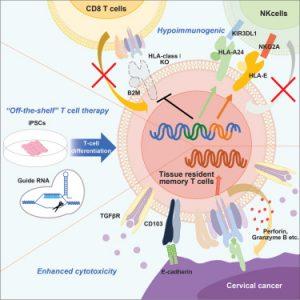Cervical cancer, a major threat to women globally, is often linked to the human papillomavirus (HPV). While HPV vaccines effectively prevent the disease, treating established cancers remains a challenge. However, a recent breakthrough offers promising hope: rejuvenated cytotoxic T lymphocytes (rejTs) (Figure 1).
These rejTs are immune cells specifically designed to target cancer. Ideally, they would be created from a patient’s own stem cells (iPSCs) for a personalised treatment. However, this approach is currently impractical.
Researchers have now achieved a significant feat: developing potent rejTs for cervical cancer treatment using allogeneic iPSCs. These are “standardised” iPSCs, not derived from each patient, but a crucial step toward wider applicability.
The challenge with allogeneic rejTs is rejection by the patient’s immune system. To address this, scientists employed a clever two-step gene editing approach using CRISPR-Cas9:
- Invisibility Cloak: HLA class I antigens, responsible for presenting “self” markers to the immune system, were deleted. This makes the rejTs invisible to CD8+ T cells that attack foreign cells.
- Selective Shield: Limited expression of specific HLA antigens (HLA-A24 and HLA-E) was introduced. This allows the rejTs to evade attacks from NK cells, which target cells lacking these surface proteins. Notably, HLA-A24 compatibility covers a significant global population.
These gene-edited rejTs displayed promising results:
- They evaded detection and elimination by the immune system.
- They effectively targeted and destroyed cervical cancer cells.
In mice with cervical cancer, rejT therapy led to:
- Increased survival rates.
- Significantly reduced tumor size and growth.
Further analysis revealed an added benefit: the rejTs included a high number of tissue-resident memory T cells. These cells reside in the cervix, offering potentially long-term protection against cancer recurrence.
This research presents a significant step forward in cervical cancer therapy. Gene-edited rejTs hold immense potential for a future where effective, personalized treatment options are widely available.
Journal article: Furukawa, Y., et al, 2023. iPSC-derived hypoimmunogenic tissue resident memory T cells mediate robust anti-tumor activity against cervical cancer, Cell Reports Medicine.
Summary by Stefan Botha











